US Urges China To Pressure Iran Over Mideast Conflict, White House Says
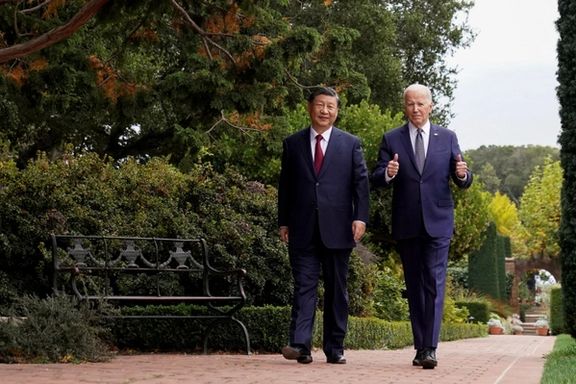
The United States wants to convey to Iran through China that it does not wish to see an escalation of the Middle East conflict, the White House said Thursday.

The United States wants to convey to Iran through China that it does not wish to see an escalation of the Middle East conflict, the White House said Thursday.
US President Joe Biden met China's President Xi Jinping on Wednesday and according to Reuters Washington urged Beijing to use its influence to discourage Iran from taking actions that might aggravate the Israeli-Hamas conflict.
China is Iran's main oil customer despite US sanctions, and lends political support to the Islamic Republic. Tehran has a clear policy of maintaining strong ties to Beijing and Moscow as a counterweight to the United States after four decades of anti-American posturing.
John Kirby, the White House's Coordinator for Strategic Communications at the National Security Council, was questioned after Biden’s meeting with Xi about whether China had given the US assurances about the discussions regarding Iran.
"We certainly would encourage them to use those lines to reiterate to the Iranians that we don't want to see a deepening or an escalation of the conflict in the region," Kirby told Reuters.
Meanwhile, Iranian Foreign Minister Hossein Amir-Abdollahian, during an interview with CBS on Wednesday concerning the ongoing conflict between Israel and Hamas, stated: "We did not want this crisis to escalate."
He also denied Tehran’s involvement in an alleged Houthi drone attack in the Red Sea on Wednesday.
In a similar vein, Reuters also reported that the Iranian regime claims it was unaware of Hamas' invasion of Israel on October 7. Hamas leaders later denied the report on their official Telegram channel and in an interview with Iranian State Iranian state news agency IRNA.

Experts are warning about dire consequences of emigration of skilled workforce, but Iran’s vice-president claims there is no cause for worry.
In an interview with a publication affiliated with Sharif University of Technology, where he serves as a professor, Vice-President for Science, Technology, and Knowledge-Based Economy, Rouhollah Dehghani-Firouzabadi, attributed the apparent increase in the emigration of entrepreneurs and the workforce to the protests of the past year and the disruptions caused by the two-year-long Covid-19 pandemic, which impacted the usual procedures for immigrant acceptance.
He justified his assertion by stating, "If, in previous years, 100 people left, the current figure is 200 people. How many experts do we have? Let’s say 2,000.”
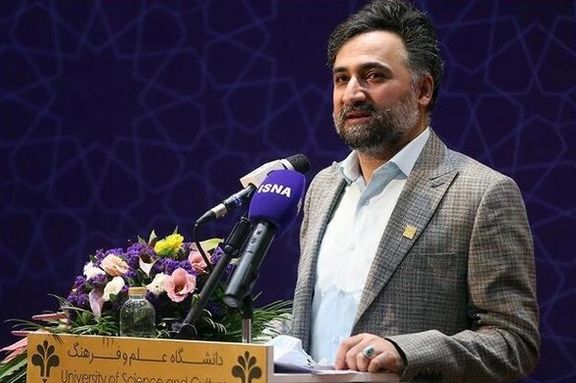
For those who have lost hope of prospects of positive change in the country, especially among the younger generation representing various backgrounds, emigration appears as the sole avenue toward a more promising life. A recent telephone poll by the US-based Statis Consulting revealed that nearly half of Iranian youth aspire to leave the country, driven by a prevailing sense of pessimism regarding their future in the homeland.
In an article last week, EcoIran, an economic news website, highlighted that the emigration of the workforce is no longer confined to physical relocation.The surge in virtual citizenship and remote work, particularly during and after the pandemic, has contributed to a substantial increase in digital emigration among Iranians. This shift has led to the migration of the activities of creative and expert workforce to international businesses,” the article said while warning that the growing desire to emigrate serves as an 'alarm bell' that has been ringing for several years, yet remains largely unheeded.”
“I’m warning that Iranian entrepreneurs and investors are redirecting their production towards neighboring countries that offer stability," Pedram Soltani, an entrepreneur and former deputy chairman of Iran's Chamber of Commerce, said in October in a tweet on the occasion of the National Export Day while also warning that factories either face the challenges of aging infrastructure and deterioration or continue to operate due to monopolistic control over the domestic market.
"Instability, uncertainties across political and social realms, a lack of a promising outlook for the future, high production risks, ad hoc legislation, and a complex and challenging business environment are cited by experts as some of the primary factors driving the migration of skilled labor from the country," Mahmood Olyaiy (Olyaei), an official of Iran's Chamber of Commerce, told the reformist Ham-Mihan newspaper.
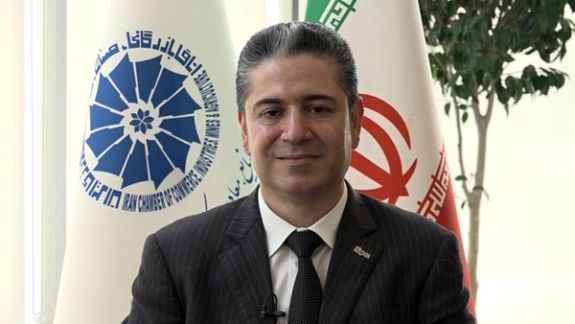
He emphasized that warnings to the government regarding the issues stemming from the emigration of skilled workforce have been ignored and there is a lack of clear policies to avert the potential consequences in the coming years.
Olyaiy added that “self-sanctioning and lack of transparency” cause reluctance in the business environment.
In a speech in September, former President Hassan Rouhani criticized the harsh treatment of the intellectual elite, alleging that some within the government are content that they were leaving the country. “They say let them go so others [who support the hardline government] can take their place,” he said.
In its 2022 report published ten months ago, Iran Migration Observatory (IMO) stated that Iran ranked 17th among countries with the highest number of individuals seeking education abroad and 54th among those with the highest emigration rates."
The IMO, a research institute established during Rouhani’s second presidential term at Sharif University of Technology, tracks data and generates analyses on emigration, with a particular focus on informing policymakers. The IMO released the inaugural edition of the Iran Migration Outlook, providing comprehensive data on Iranian migrants globally, international students, and those seeking asylum.
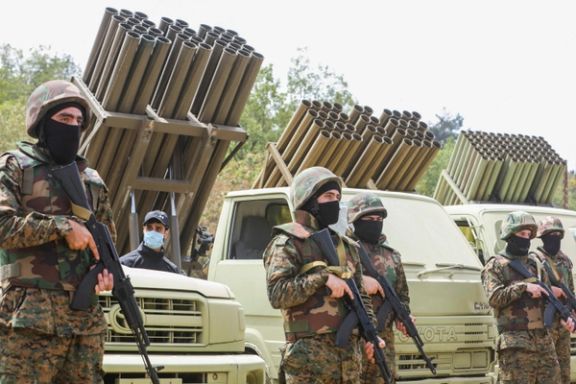
Clashes have intensified near Lebanon-Israel border as Iran-backed Hezbollah militants fired several missiles towards northern Israel on Thursday.
Air raid sirens were set off in some northern Israeli cities after Hezbollah’s offensive, Haaretz news website reported.
The Israeli Defense Forces announced that the missiles fell in an unpopulated area.
Meanwhile, Times of Israel reported that Hezbollah militants also targeted an Israeli army position in Dovev in the Upper Galilee near the country’s border with Lebanon.
No casualties were reported in the raid, Times of Israel said.
According to Reuters, Hezbollah confirmed in a statement that it attacked 8 targets in Israel on Thursday, including a group of Israeli soldiers.
The attacks were carried out “in support of our steadfast Palestinian people in the Gaza Strip," the statement added.
The Israeli army retaliated by shelling some areas in the Lebanese territory, including a site used by the group’s fighters to launch anti-tank missiles.
Israeli air strikes hit “a dozen villages” in southern Lebanon, Reuters quoted a Lebanese security official as saying.
According to the official, today has been one of the most violent days in clashes between Hezbollah and Israel since the beginning of the conflict on October 7.
The clashes near Israel-Lebanon have so far claimed the lives of 70 Hezbollah fighters and 10 civilians in Lebanon. Moreover, 7 soldiers and 3 civilians lost their lives in Israel during the exchanges of fire.
Last week, Israel defense minister Yoav Gallant threatened a heavy cost for the Lebanese if Hezbollah “crossed the red line.”
Tehran openly supports Hezbollah and its other proxy groups but maintains that they all act independently, avoiding direct responsibility for their military operations against Israel and American interests in the region.
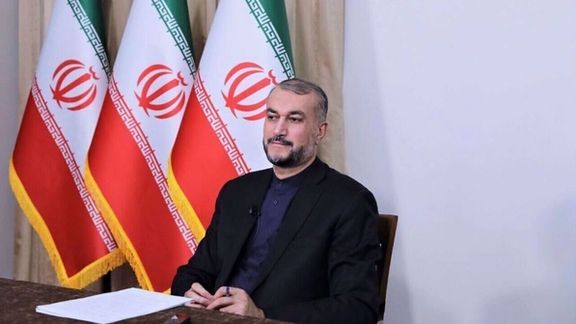
Iranian Foreign Minister Hossein Amir-Abdollahian has denied responsibility for a drone attack that was intercepted by the US Navy in the Red Sea on Wednesday.
According to the Pentagon, a US Navy warship shot down a drone early Wednesday morning that “originated from Yemen and was heading in the direction of the ship.”
Although the Pentagon did not specify who was behind the attack, the incident occurred after Iranian-backed Houthi forces in Yemen earlier this week vowed to target Israeli ships in the Red Sea.
As part of an interview with CBS on Wednesday regarding the ongoing war between Israel and Hamas, Amir-Abdollahian said: "We did not want this crisis to escalate."
The terrorist group Hamas launched a surprise terror attack on Israel on October 7, killing at least 1,200 civilians and taking at least 240 hostages, after which Israel started a massive retaliation against Gaza.
The alleged Houthi attack comes after calls by Iran’s leader Ali Khamenei to ban shipment of oil and food to Israel. His call was repeated by his ultra-hardliner loyalists such as Hossein Shariatmadari, who runs the Kayhan Daily newspaper in Tehran.
The firebrand Hossein Shariatmadari called for blocking "maritime traffic in the Persian Gulf, Bab-el-Mandeb Strait, the Oman Sea, the Red Sea and the Suez Canal,” in a Kayhan Daily editorial, which is funded by the Supreme Leader.
Prior to this, an Iranian ultraconservative lawmaker also claimed on Wednesday that Houthis had targeted Israeli ships after Ali Khamenei had made public statements against Israel.
Mahmoud Abbaszadeh-Meshkini, who sits on the Parliament’s National Security and Foreign Policy Committee, has criticized Amir-Abdollahian for what he called the government’s soft stance towards Israel.
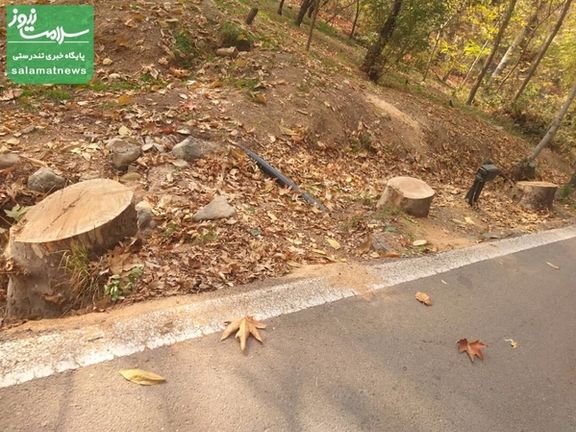
The felling of ancient trees in Tehran's historical Sa'dabad Cultural-Historical Complex, home to the Shah's palace, has sparked controversy from environmental activists.
The historical complex constructed by the Qajar and Pahlavi monarchs, sprawling over 110 hectares in northern Tehran, encompasses natural forests, canals, gardens and museums, one of the capital's most famed destinations.
Recent public outrage ensued as images circulated depicting the removal of at least four aged trees on Italy Street in Tehran. Despite claims by eyewitnesses that one tree was “alive”, the municipality asserted that two were entirely “dry”, justifying the action as a precautionary measure to “eliminate the danger.”
Several years ago, a similar incident occurred when trees in the Sa'dabad complex were cut to construct a restaurant. Cultural heritage authorities defended the action, citing the trees as “annoying, obstructive, and pest-infested.”
Despite stringent penalties, including imprisonment, outlined in the Islamic Republic's laws for arbitrary tree cutting, little evidence has shown enforcement. Moreover, there is no reported information on whether municipal authorities have undertaken tree planting initiatives to compensate for the loss of aged and dry trees in Sa'dabad or elsewhere.
Urbanization has long posed a threat to Tehran's historical natural landscapes. The ancient trees that line Tehran's longest boulevard, Vali Asr, have over recent years also fallen victim to redevelopment projects - and even merchants who want better visibility for their shops.
Two years ago, the regime also came under fire for selling its Palm trees to countries including Qatar and Kuwait, the uprooting having devastating effects on the local ecosystem.
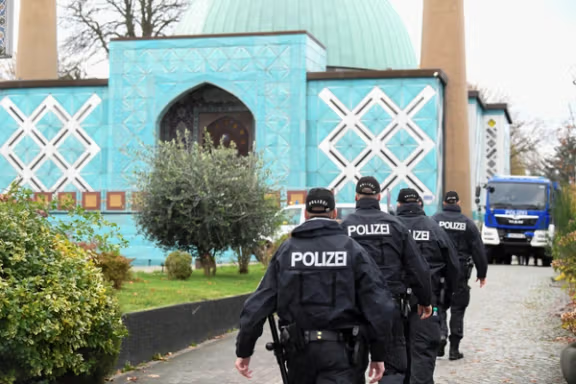
Germany's federal police raided the Islamic Center of Hamburg on suspicions of support for the Lebanese militant group Hezbollah, accused of terrorism.
The interior ministry said the Khamenei-controlled Islamic Center of Hamburg (IZH) activities are “aimed at spreading the revolutionary concept of the Supreme (Iranian) leaders,” and that the center allegedly undermines Germany’s “constitutional order.”
The German interior minister, Nancy Faeser, from the Social Democratic Party said, “We have the Islamist scene in our sights. Especially now, at a time when many Jews feel particularly threatened, we generally do not tolerate Islamist propaganda or antisemitic and anti-Israel incitement.”
The IZH has been a hotbed of pro-Hezbollah activism and support for Qassem Soleimani, the former commander of IRGC's Quds Force. In January 2020, after the US killed Soleimani in a drone strike in Iraq, a group of 600 pro-Iran regime Islamists attended a memorial service at the Hamburg center to mourn his death. The Islamists praised him as a “heroic martyr.”
Germany’ interior ministry outlawed all Hezbollah activities in 2020. In addition to the raid on the IZH in the city-state of Hamburg, the German authorities searched 54 properties across six other German states— Baden-Wuerttemberg,Bavaria, Berlin,Hesse, North-Rhine Westphalia and Lower Saxony. There were no arrests made during the raids. Faeser said with an apparent reference to the troika Hamas, Hezbollah and Iran’s regime (via its proxies) carrying out terror attacks against Israel and US military forces that "Now especially is the time to be on high alert and for a tough approach. This is why we are following every reasonable suspicion seriously."

German-Iranians and dissidents expressed support for the crackdown on the IZH.Dr. Kazem Moussavi , a spokesman for the Green Party of Iran in exile, told Iran International that “The police searches of the IZH and its associated religious institutes are now to be welcomed. But this is inadequate. After banning Hamas and Samidoun, interior minister Faeser should now finally immediately ban the IZH, whose regime is indisputably the decisive mastermind and supporter of the Hamas pogrom against Israel on October 7, 2023.”
In early 2023, the German Federal Administrative Court ruled that the IZH (and its affiliated Blue Mosque are an "extremist Islamic organization."
Moussavi, who has spent years campaigning to bring about the closure of the IZH, added, “The IZH is not a place of prayer for secularist and democratic Muslims but a refuge for jihadist regime supporters, secret service personnel and sympathizers of Hamas and Hezbollah.”
Sheina Vojoudi, a Germany-based associate fellow for the Gold Institute for International Strategy told Iran International that “For years Iranian dissidents try to convince Germany to close the Islamic Centre funded by the Islamic Republic in Hamburg, which according to German courts, is an ‘extremist Islamic organization’.”
She added “All the Islamic centers funded by the Islamic Republic with Iranian wealth must be closed. The Islamic Republic’s intention is to spread antisemitism, observe and threaten Iranians everywhere and build its network all over the world to export its revolution.”
In October 2020, roughly 150 demonstrators urged the city of Hamburg to close the IZH.
According to Vojoudi, " it’s an absolute fact that Hamas is funded and trained by the Islamic Republic and the October 7th terrorist attack on Israel is a warning message to the West considering that Iran’s regime also built its Islamic centers in the heart of Europe. The western city partnerships with the Islamic Republic in Iran legitimize its terror actions and it’s time to reconsider the continuation of the German city partnerships like Freiburg-Esfahan partnership before it’s too late.”
Iranian dissidents have urged Martin Horn, the mayor of Freiburg in southwestern state of Baden-Wuerttemberg, to end its twin city partnership with the Iranian regime in Esfahan. Horn has been vehemently opposed to pulling the plug on the partnership. Iran International sent press queries to Horn after reporting in August that Iranians urged the city of Frankfurt to close a center affiliated with the Islamic Republic.
The capital of Stuttgart in Baden-Wuerttemberg continues to post information about a reportedly pro-Hamas group on its municipal website. Iran International press queries to mayor Frank Nopper of Stuttgart were not immediately returned.
Nopper has refused to delete the notice. Rabbi Abraham Cooper, the associate dean of the Simon Wiesenthal Center, told Iran International "What more needs to be said that one month after the most barbaric mass murder, rape kidnapping and hostage taking of Jews since the Holocaust, Mayor Nopper and his associates allow pro-Hamas postings on the city’s website while 30 Jewish children are held as hostages, It is despicable antisemitism and proves some in Germany have not and will never learn the basic lessons and historic responsibilities from the Nazi Holocaust for Germans."
Iran International sent press queries to Oliver Vrankovic, the chairman of the German-Israel Friendship Association in Stuttgart, whose organization claims to be against Iran’s regime and its proxies, Hamas and Hezbollah. Vrankovic and his foreign ministry funded NGO have refused to publicly urge Nopper to expunge the pro-Hamas information on the taxpayer funded municipal website.